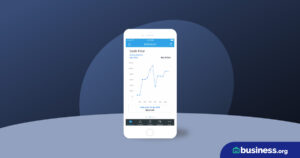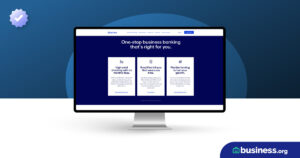💸 See if your business qualifies for a tax credit worth up to $26k per employee. 📞 Call Now: 855-979-9597
Verizon vs. Comcast Business Internet: What’s the Best ISP for Small Business?
We are committed to sharing unbiased reviews. Some of the links on our site are from our partners who compensate us. Read our editorial guidelines and advertising disclosure.
Data as of 12/7/22. Offers and availability may vary by location and are subject to change.
If you’ve been shopping for business-grade internet, you’ve probably encountered plans from two well-known internet service providers (ISPs): Verizon and Comcast.
Both of these mega-corporations offer high-speed internet access to businesses across the nation. But which one should you choose to carry your precious business data? According to our research, that’s an easy decision.
With Fios business internet, Verizon offers faster plans at lower prices and outstanding customer experience.

But you shouldn’t dismiss Comcast's business internet plans. Despite the company’s poor reputation with certain pockets of the public, business customers can find a lot to like about the company. For instance, unlike Verizon, Comcast offers free installation in some areas, plus free 24/7 customer support—with Verizon, you have to bundle services for round-the-clock help.
In this post, we compare internet plans from both companies so you can decide on the right business ISP for you.
Verizon Business vs. Comcast Business internet plans
Data as of 12/7/22. Offers and availability may vary by location and are subject to change.
Up to 3 Mbps download speeds & 768 Kbps upload speeds
Verizon Business internet overview
Verizon Communications, a child of the late-twentieth-century breakup of the colossal Bell Telephone Company,1 is a US-based, international telecommunications organization. Verizon provides landline and wireless internet, phone, and TV services to businesses and residents. Business internet plans from Verizon, depending on location, include digital subscriber line (DSL) and fiber-optic internet connections.
Read more in our Verizon Business internet review.
Comcast Business internet overview
Comcast is a national provider of TV, phone, and internet services. The company is probably best known for its cable TV service, which uses the Xfinity brand name. As an international conglomerate, Comcast owns NBCUniversal and many other media companies. Depending on the location, American business customers can purchase Comcast cable plans.
See our Comcast Business internet review to learn more.
Verizon and Comcast plans: DSL, HFC, and fiber
It can be difficult to compare the business internet plans that Verizon and Comcast sell because the connections they use can be significantly different. It’s true that in some areas, both companies offer what some call “purely fiber-optic” plans, which use glass fiber-optic cables to deliver blazingly fast internet speeds.
If you compare only these fiber plans, Verizon comes out on top. Verizon offers fiber plans from $69 to $249, with download speeds from 200 to 940 Mbps.
Comcast, on the other hand, sells fiber plans starting at $69.95 for 35 Mbps. The top-speed Comcast plan—Business Internet 1 Gig—reaches download speeds at a full 1,000 Mbps (or 1 Gbps), but it’ll cost you $250 more per month than the similarly fast Verizon plan.
Verizon Business fiber internet plans and pricing
Data as of 12/7/22. Offers and availability may vary by location and are subject to change.
*w/ 2 yr. agrmt. (term not specified in sales materials) plus taxes, fees & equip. charges.
Both companies’ fiber plans are symmetric, which means their upload speeds match (or nearly match, in the case of Verizon’s fastest plan) their download speeds. Fast upload speeds are essential if your business commonly uploads or shares large files or hosts lots of video conferences.
By signing up I agree to the Terms of Use and Privacy Policy.
Comcast Business fiber internet plans and pricing
Data as of 12/7/22. Offers and availability may vary by location and are subject to change.
*with 2-year agreement
**For 12 months with 2-year agreement
†with 2-year agreement
When it comes to the more widely available business internet connections, the comparison is trickier. Verizon’s DSL plans use copper phone lines to provide internet. Comcast commonly uses cable technology—the same technology that delivers cable TV—for consistently faster speeds than DSL allows for.
Yet some things are clear: First, Verizon’s DSL plans are—on average—cheap, but slow. Verizon’s most affordable plan is $47.99. Still, that gets you speeds of only 3 Mbps download and 768 Kbps upload.
Verizon Business 5G internet plans and pricing
Data as of 12/7/22. Offers and availability may vary by location and are subject to change.
Second, Comcast’s cable plans tend to be pricier than Verizon’s DSL plans, but they offer excellently fast download speeds. With download speeds ranging from 25 to 1,000 Mbps—alongside acceptably fast upload speeds—they’re worth considering for most businesses.
Finally, Verizon business internet plans are limited to only a few areas in the US. Fios is available in just 10 eastern states and DC. The other high-speed internet plans are also available in only these 10 states and DC, but solely in areas where Fios isn't an option. So although many of Verizon’s plans are faster and cheaper than Comcast’s, you’re far less likely to have access to Verizon.
Compare bundles and value-added services
Data as of 12/7/22. Offers and availability may vary by location and are subject to change.
* w/ 2 yr. Agrmt. Plus taxes, fees & equip. charges
** for first 24 months. With 2-yr agmt.
Like most high-speed internet service providers, Comcast and Verizon love to bundle. Internet bundles combine internet with other services like phone or TV, saving you a bit of money on the total package. Verizon and Comcast offer similarly priced phone and TV bundles. Both service providers offer Voice over Internet Protocol (VoIP), which delivers phone service via your internet connection.
Verizon offers superior customer service
Our final area of focus is customer service. Business customers need to rely on their internet service provider to quickly and effectively troubleshoot problems, handle billing issues, and repair broken connections.
In this area, Verizon rules. For 2022, J.D. Power ranked Verizon in the top three of every business segment surveyed.2 If you’re looking for an internet company you can trust to keep you a happy customer, Verizon seems pretty good.
J.D. Power business internet customer satisfaction
The takeaway
In the Verizon versus Comcast match up, Verizon is the winner. Although Comcast Business offers decent plans at affordable rates, it can’t beat Verizon’s superior customer service. And Verizon’s top fiber plans are faster and better priced than Comcast’s.
If you don’t think either Verizon or Comcast will work for you, no worries. There are plenty of other internet fish in the sea—our article on the best internet for small businesses showcases a few.
Business Internet FAQs
We’d all like to have the fastest service at the lowest cost. But nobody’s budget is infinite, and every business owner looks to cut costs where they can.
So how can you know which internet plan will give you enough speed to keep your business running smoothly and your customers paying? We broke down internet download speeds to provide you with a better idea.
Remember, these figures signify only download speeds, or the rate at which you receive data from your broadband internet provider. Upload speeds, which represent how fast you can send data up to the internet, are different. If you need fast upload speeds, fiber-optic network plans that offer symmetric download and upload speeds are your best bet.
It’s true: your internet plan is probably seeing other people. Most internet connections are shared, which means your service provider is sending data to more than one customer through a single line.
Shared internet can become a problem for businesses if you depend on high, reliable bandwidth for things like file sharing, videoconferencing, and VoIP, because your fellow customers can hog the line.
Older internet technology like DSL and cable is prone to clogged bandwidth on shared lines. With fiber-optic technology, shared lines aren’t as much of a problem because data is sent at nearly light speed anyway.
Still, some businesses choose to purchase dedicated internet. With these connections, your internet connects to you and only you. No other customers can suck up that precious bandwidth.
Verizon and Comcast both offer dedicated internet plans for business customers. You’ll have to contact a sales representative to get pricing, but if you’re a data-heavy internet user, you may want to consider the option.
Methodology
We did an in-depth analysis of both Verizon and Comcast business internet plans and bundles. We compared pricing, guaranteed uptimes, customer service, customer satisfaction, and bandwidth. These brands were also considered in the broader context of other top internet providers on the market today.
Disclaimer
At Business.org, our research is meant to offer general product and service recommendations. We don't guarantee that our suggestions will work best for each individual or business, so consider your unique needs when choosing products and services.
Sources
1. Verizon, “History and Timeline.” Accessed December 7, 2022.
2. J.D. Power, "Small Business Wireline Customer Satisfaction Remains High Despite Fierce Market Challenges, J.D. Power Finds," July 7, 2022. Accessed December 7, 2022.







